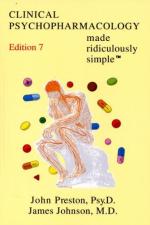|
This section contains 297 words (approx. 1 page at 300 words per page) |
Psycho-pharmacology is that branch of science that involves the study of the effects of interactions between drugs that affect the central nervous system (i.e., psychoactive drugs) and living systems. Behavioral and neurobiological effects as well as the mechanisms of actions and side effects of drugs are often examined. Pre-clinical studies of psychoactive drugs using animal models and tissue preparations are an important aspect of psychopharmacology, contributing to our understanding of the mechanisms involved in disorders of the central nervous system and mental illness. Clinical psycho-pharmacological investigations include examining the effects of drugs used in treating psychiatric disorders (such as anxiety, depression, schizophrenia, and mania), as well as other dysfunctions within the central nervous system (such as movement disorders, Alzheimer's disease). Also included is study of the effects of psychoactive drugs used non-medically to induce altered states of consciousness, to improve mood, or to otherwise affect the mental status and/or behavior of the individual. A growing area of research in psychopharmacology addresses disorders of addiction or dependence to some of these drugs. New treatments for alcoholism (naltrexone), opioid dependence (burprenorphine), and smoking cessation (bupropion) have resulted from these efforts, and many more treatments are under development. Some of the drugs used for treatment of depression and anxiety are also being investigated for potential usefulness in treating substance dependence, since it is often accompanied by these comorbid conditions.
Psychopharmacology is an interdisciplinary field of science. Psychopharmacologists may be physicians trained in psychiatry or neurology, psychologists with extra training in pharmacology, or pharmacologists with special training in psychology and behavior.
Bibliography
BLOOM, F. E., KUPFER, D. (ED.). (1995). Psychopharmacology: the fourth generation of progress, New York: Raven Press.
NEMEROFF, C.B.& sCHATSBERG, A.F. (ED.). (1998). The American Psychiatric Press Textbook of Psycho-pharmacology. Washington D.C.: American Psychiatric Press.
|
This section contains 297 words (approx. 1 page at 300 words per page) |


